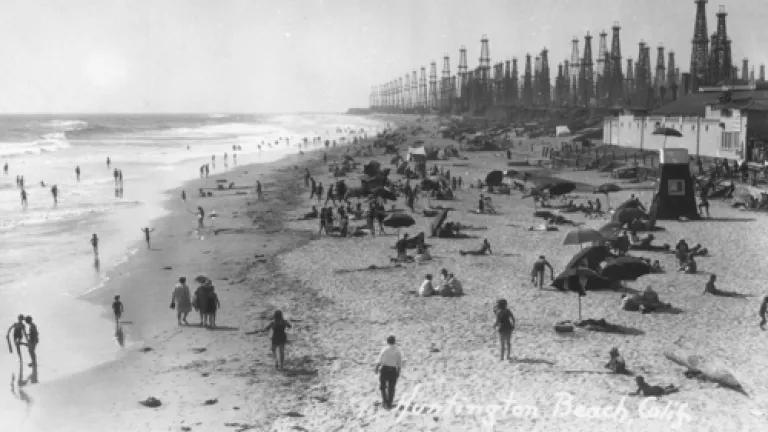
This guest post by NRDC Legal Fellow Jamie Friedland provides context for our new report with Heal the Bay entitled "Tideland Oil & Gas Drilling in California: Is Santa Monica Bay at Risk?"
Big Oil is playing small ball--right in our backyards. It's no secret that oil companies spend hundreds of millions of dollars each year on lobbying, and of course California is no exception: oil companies have already spent more than $70 million lobbying in California just since 2009. But recently, these multinational corporations have demonstrated an alarming willingness to bring their Washington tactics and political spending to local governments and quiet towns with the misfortune of merely sitting atop potential oil reserves. Here in Southern California, there will be two special elections about local oil drilling in March: one in Hermosa Beach, a quiet coastal city of under 20,000 people just south of the LAX airport, and one in La Habra Heights, a rural canyon community of just 5,000 on the border or Orange and Los Angeles Counties that has no commercial activity, sidewalks or even street lights. Not coincidentally, this month, there have also been lawsuits in both of those cities.
In Hermosa Beach, residents decided that they did not want oil drilling in their community, so they passed a ballot initiative banning oil production in the '90s. An oil company with plans to drill in Hermosa promptly sued, claiming hundreds of millions of dollars in allegedly lost profits. After years of legal battles, the city settled the lawsuit because it was unable to risk such an exorbitant cost and was weary of the suit's already expensive price tag. In that settlement, the oil company extracted a promise that the city would hold a special election to determine whether to allow oil drilling--so that the company would have a chance to use its money to try to influence voters directly.
Last month, both the oil company and the community activists opposed to this oil drilling submitted their respective ballot arguments, which residents will be able to read when the go into the voting booth. But instead of just letting voters read both arguments and decide for themselves, the oil company tried to tip the scales further in its favor by demanding that the community members weaken their ballot argument. When the activists refused to let the oil company rewrite their argument against drilling, the company sued, alleging that the activists' argument was false and misleading for making such unremarkable and even factual statements as calling oil pipelines "dangerous" and the chemicals, carcinogens, and pollution from oil drilling "unhealthy."
NRDC has been working with Hermosa Beach activists on this fight for years, and eagerly offered our assistance as consultants to the legal defense on this case. We are happy to report that on December 19, a Superior Court judge denied the oil company's petition, rejecting the company's claims that the ballot argument against the drilling project was misleading. Yet despite this win, oil will still be on the ballot in March, so NRDC will remain involved with our coalition partners in Hermosa because there is plenty of work to do to keep oil drilling out of the Santa Monica Bay.
"View from Huntington Beach pier," photo courtesy of Orange County Archives. California has made great progress in cleaning its coast. There's no reason to backslide now.
In La Habra Heights, a similar story is unfolding. There, local residents will soon vote on a ballot initiative to keep high-intensity petroleum operations, including fracking, out of their community. And like in Hermosa Beach, oil companies declared that language used in the ballot was unfair, this time for the title of the initiative. The oil companies threatened to sue, so the City Council approved "compromise language," which actually misrepresents the ballot initiative and could dissuade voters who might otherwise support it. Councilmembers specifically said they voted for the new, confusing language to avoid spending $50,000 defending a lawsuit.
That is the exact reaction oil companies want. It is the reason why they are willing to bring so many lawsuits like the challenge NRDC helped beat back in Hermosa Beach: for them, the cost of litigation is a drop in the oil drum, and even failed lawsuits remind small city governments of the cost of resisting even meritless oil company demands. Fortunately, in this case, members of the community were able to team up with Earthjustice and the Center for Biological Diversity, who sued to have the ballots printed with accurate language. They prevailed on December 31 and again on January 7, so voters will now be able to understand what they are voting for in March.
These were two positive outcomes, but communities across California are still facing drilling in their backyards and local decisions about drilling remain vulnerable to Big Oil's deep pockets and influence. To highlight one facet of this risk, we have produced a report with Heal the Bay that highlights the legal protections against, and vulnerabilities to, oil drilling in the Santa Monica Bay, and urges coastal cities to stand strong and united against oil company machinations. Implementing that strategy, the Hermosa coalition has sought and begun to obtain supportive resolutions from other coastal city councils, such as Santa Monica, supporting Hermosa Beach in its opposition to oil drilling in the Santa Monica Bay. And on February 12, 2015, we are cosponsoring an environmental forum featuring remarks by NRDC Special Counsel Robert F. Kennedy, Jr. and prominent environmental advocate Ed Begley, Jr. to increase awareness of the risks of coastal oil drilling. We hope you can join us there.
When oil companies get involved in local governments and elections, most individual cities and concerned citizens simply do not have the cash to fight back, and that's what the oil companies are counting on. NRDC is working with affected and supportive communities throughout Southern California to show those companies that they cannot buy our public health and clean beaches.

